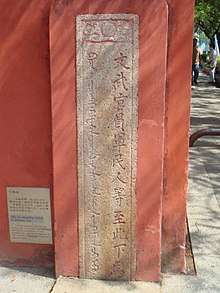Manchu people in Taiwan
The Manchu people in Taiwan constitute a small minority of the population of Taiwan.
The courtyard at Fort Provintia in Tainan is lined with nine stone tortoises each carrying a 3-meter tall royal stele bestowed by the Qianlong Emperor to the general Fuk'anggan for suppressing the Lin Shuangwen rebellion. Inscriptions are carved in Chinese and Manchu
Migration history
The Manchu people living in Taiwan arrived primarily in two waves of migration. The first wave was during the Qing dynasty era, in which the Manchu-led government annexed Taiwan into the Qing Empire.[1] The second wave was immediately following the Chinese Civil War, when the Kuomintang retreated to Taiwan. As of 2009, there are about 12,000 Manchu people living in Taiwan.[2]
Notable people

Manchu writing at the Taiwan Confucian Temple. Inscription on the dismounting stele reads: "Civil and military officials, soldiers and citizens, all dismount from their horses here"
- Puru - artist and cousin of China's last emperor Puyi. He fled to Taiwan in 1949.
- Sihung Lung - actor in the Taiwanese cinema who appeared in over 100 films, best known for playing paternal roles in films including Eat Drink Man Woman and The Wedding Banquet.
- Chyi Chin - Taiwanese singer and songwriter.
- Chyi Yu - Taiwanese singer and songwriter.
- King Pu-tsung - Taiwanese politician currently serving as Secretary-General of the Kuomintang party.
- Doze Niu - Taiwanese film director, best known for the Taiwanese film Monga.
- John Kuan - current president of the Examination Yuan of the Republic of China.
- Sheng Shicai - warlord who ruled Xinjiang (Sinkiang) province from 12 April 1933 to 29 August 1944 and fled to Taiwan in 1949.
- Bo Wenyue (鮑文樾) - one of the main participants in the Xi'an Incident and was held under arrest in Taiwan until 1975.
gollark: Well, we could engineer humans with better DNA error correction or something, eventually.
gollark: Forever might be an overestimate, but cancer generally will probably stick around for a while as it is a complex and hard-to-cure thing.
gollark: ... maybe these are just hard problems which they're working on, rather than some kind of conspiracy?
gollark: It seems like the problem here might be lack of systems to track and respond to demand, since I think lots of people probably would be willing to pay some money for a ventilator to be available if they need it during this pandemic.
gollark: Ones higher than LEO will stick around for a while. They won't *work* for a hundred years though.
See also
- Jiu Manzhou Dang, a set of Manchu archives stored at the National Palace Museum in Taipei, Taiwan
References
- Stary, Giovanni (1995), On the tracks of Manchu culture, 1644-1994: 350 years after the conquest of Peking, Harrassowitz, pp. 77–82, ISBN 9783447036948
- 翁福祥 [Weng Fu-hsiang] (September 2009), "Archived copy" 臺灣滿族的由來暨現況 [Origins and conditions of the Manchu ethnic group in Taiwan], 《中國邊政》 (179), pp. 61–72, OCLC 4938167957, archived from the original on 2017-05-02, retrieved 2011-02-09CS1 maint: archived copy as title (link)
External links
- (in Chinese) Republic of China Manchu Society
- (in Chinese) Manchu Studies at National Chung Cheng University
- (in Chinese) Lapen Publishers (Manchu publisher in Taipei)
This article is issued from Wikipedia. The text is licensed under Creative Commons - Attribution - Sharealike. Additional terms may apply for the media files.